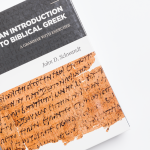
In this excerpt from Tidings of Comfort and Joy: 25 Devotions Leading to Christmas, Mark Yarbrough shares a reflection about God’s everlasting love for his people and it’s fullest expression in the birth of Jesus.
After meeting at a Bible college in Kentucky, my folks married and moved to Texas, my dad’s home state. Dad’s folks lived nearby, so his mother (my grandmother) felt a calling to help nurture and encourage her new daughter-in-law. My mom felt a genuine closeness to my grandmother, and they had many beautiful moments and talks together. My mom remembers one very important discussion they had before my grandmother died. She said, “J. R. [that’s what she called my mom], always remember that love flows downward more than it does upward.”
From a human standpoint, my wife Jennifer and I have a growing understanding of what her words meant. It is with vivid memory that I recall the day when our first child, Kayla, was born. I remember how Jennifer looked with our baby in her arms in the hospital just after giving birth: holding her, smiling at her, looking at me, crying, laughing, all within moments of each other. That, forever, is etched into my mind. We looked at our baby and our love flowed downward to her. And it was that same emotion as Jacob, Kayci, and Joseph joined the tribe. Shockingly, they are now adults—and lo and behold, we’ve even added another son, Garrett, by marriage to Kayla. My grandmother was right: love is more downward than upward. It always will be.
If this is true on a purely human level, how much more does it reveal the heart and nature of God, our heavenly Father, and his love for us. With him, the pattern is well established. Throughout the entire biblical narrative there is one story after another which demonstrates God’s love for his people. The common denominator for each story is that his love is undeserved, unmerited, and unjustified. It is all of grace, and it flows downward. Ultimately, the greatest picture of God’s love is found in Jesus the Messiah. And the greatest expression of that love is seen in what he came to do: save us from our sins, snatch us from the warranted pit of hell, and grant us life everlasting. While this truth is articulated many times in holy Scripture, the most well-known, T-shirt-worthy, goalpost-painted summary is John 3:16: “For God so loved the world that he gave his one and only Son, that whoever believes in him shall not perish, but have eternal life.”
This rightfully heralded passage is worthy of reflection again during the Christmas season, for it is pregnant with nativity relevance. Please allow me to turn word-nerd on you for just a moment. If we simply identify the key nouns and verbs, look at what the text says:
- God loved the world. That means God loves this muddled, broken place we call home.
- He (God) gave his Son. That means God slept in the manger because of love.
- Those who believe in him (the Son) will not perish but have life. It means that baby Jesus brought life into this world of death.
Take it one step further and note the modifiers. God so loved the world. This emphasizes the degree of the love. God gave his one and only Son. This states that he is the only provision of salvation. God grants eternal life to those who believe. Simply put: Jesus brings “forever” life.
See, friends, it all culminates in Jesus—God’s greatest picture and expression of love flowing downward. God became a man so that he could save us from our sins. That is what the angel first told Joseph in a dream: “You are to give him the name Jesus, because he will save his people from their sins” (Matt 1:21). The baby also was to be called Immanuel, which means “God with us” (Matt 1:23). That is how much God loved us. Love came down and rescued us. He emptied himself of the glories of heaven to join us; there is no greater love than that. It flowed downward, even at a time when there was little or none flowing upward. The apostle Paul wrote, “God demonstrates his own love for us in this: While we were still sinners, Christ died for us” (Rom 5:8).
What does God ask in return? It is obvious that we can never perfectly reciprocate God’s love; nonetheless, he first asks us to trust him. He longs for us to recommit our belief that the Babe of Bethlehem is God in flesh, the one who came to pull us out of this mess. In this season we are called to confess again God’s love for us as manifest in the person of Jesus Christ, the fulfillment of the Old Testament Prophets. At Christmas we are afforded the opportunity to remember that he came to pay the price for our debt. And we are asked to love others because he first loved us.
We are asked to remember that love flows downward.
Way to go, Grandmother. Although you are gone from us, you still preach truth.
Advent Application
Look up the Nicene Creed, write it out by hand, and reflect on the orthodox claims within it.
The Nicene Creed is a valuable summary of Christian doctrine and is likely the most universally accepted and recognized statement of the Christian faith. The Nicene Creed was first adopted in AD 325 at the Council of Nicea, and later refined at the Council of Constantinople in AD 381. As with any creed, it is important to define words and phrases with accuracy. In this particular creed it is helpful to understand the term “catholic” to mean universal, the word “apostolic” to mean built upon the teachings of the apostles, and the reference to baptism for cleansing from sins as a picture of salvation in Christ. All creeds are attempts to codify the conviction of the faith, and it is beneficial to reflect on our belief in what God has revealed in his word.
Prayer
Heavenly Father, I know you have loved me more than I could ever love you. This season of the year demonstrates that. You loved me so much that you sent your only Son to enter this world as a babe in a manger. Thank you for revealing such truths to me through your word. I am committed to you. Thank you for showing me your love. May my love for you increase each day. In the name of Jesus, Amen.

This post is adapted from Tidings of Comfort and Joy: 25 Devotions Leading to Christmas by Mark Yarbrough (Kirkdale Press, 2021).






